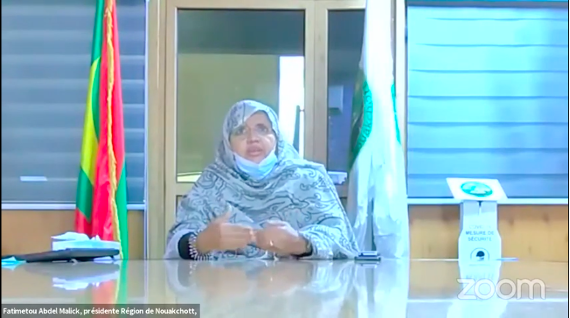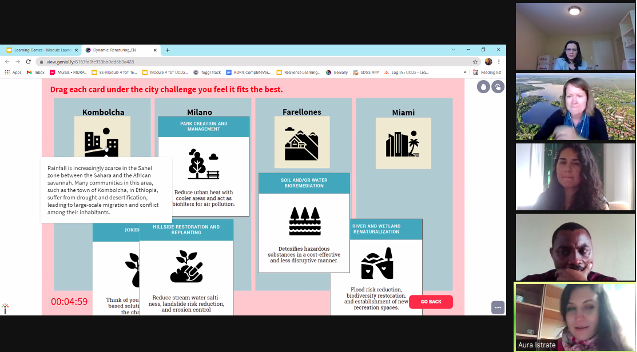Resilience Learning Modules – tools to advance the development of system-based strategies and action plans
25.10.2021
October 13 is the International Day for Disaster Risk Reduction, an agenda that sadly gained global prominence in the last two years due to the pandemic and its cascading effects. Building on the practical experience of its membership and partners, UCLG has gone beyond a campaign, training the network to develop DRR and resilience strategies in practice, through peer-learning and playful methodologies.
Within the context of the Innovate4Cities Conference, UCLG, UN-Habitat and UNDRR launched the second volume of their Resilience Learning Modules, focusing on practical approaches, strategies and actions for local, metropolitan and regional governments to accelerate resilience-building. During the session, city officers, practitioners, academics, civil society, and other stakeholders working at the local level had the opportunity to engage and interact with the main topics of the module, as well as new learning tools and dynamics.
To open the session, Mme Fatimetou Abdel Malick, President of the Nouakchott Region of Mauritania, and co-chair of UCLG Policy Council on Safer, Resilient and Sustainable Cities, Capable of Facing Crises, shared her work leading DRR actions and resilience building at the local and regional level over the years. Along the experience and progress in Nouakshott, that is a desert city counting on multiple challenges, she highlighted how resilience is a crosscutting theme weaving together a lot of LRGs work on public service provision, social inclusion, local economic development, ecological transition, and emergency governance: She invited other local and regional leaders to continue empowering each other and sharing experiences, engaging with the learning modules and other initiatives such as MCR2030. Resilience is a cornerstone of the new social pact that the constituency of United Cities and Local Governments (UCLG) has adopted, with ‘Planet’ as one of its main axes, as we build back better, leaving no one and no place behind.
 Following her opening remarks, Mutarika Pruksapong of UNDRR and Juan Carlos Uribe of UCLG Learning introduced the development process and contents of the second module, built upon the experiences and expertise of many member cities and partners. The second volume brings together the work LRGs are doing across its many lines of work, covering through five different chapters the following topics:
Following her opening remarks, Mutarika Pruksapong of UNDRR and Juan Carlos Uribe of UCLG Learning introduced the development process and contents of the second module, built upon the experiences and expertise of many member cities and partners. The second volume brings together the work LRGs are doing across its many lines of work, covering through five different chapters the following topics:
- Importance of scientific evidence to understand contexts and engage all sectors, stakeholders and resources in the implementation of system-based, locally sensitive strategies
- Enhancing Social Resilience through a rights-based approach, cultural actions, and local economic development
- Managing Resilient Urban Development through strategic planning, integrating resilience into infrastructure and asset management, including in informal context.
- Fostering Regional and Ecological Resilience through the use of Nature-based Solutions and greater consideration for ecosystem services across municipalities.
- Effective Response, Recovery and Building Back Better, including through enabling multilevel and multistakeholder governance and coordination mechanisms.
 The session continued by putting a spotlight on the module’s chapter on Ecological Resilience and Nature-based Solutions. Sandra Naumann, Senior Fellow and Coordinator for Biodiversity and Nature-based Solutions (NbS) at the Ecologic research institute, explained the potential benefits of NbS when implemented and incorporated in Cities, as well as some of the challenges that need to be considered to advance their adoption. Following this presentation, participants engaged in a dynamic game “Renaturing Pathways” through which they were able to learn more about different types of nature-based solutions, and reflect on their use to respond to different urban challenges and contexts.
The session continued by putting a spotlight on the module’s chapter on Ecological Resilience and Nature-based Solutions. Sandra Naumann, Senior Fellow and Coordinator for Biodiversity and Nature-based Solutions (NbS) at the Ecologic research institute, explained the potential benefits of NbS when implemented and incorporated in Cities, as well as some of the challenges that need to be considered to advance their adoption. Following this presentation, participants engaged in a dynamic game “Renaturing Pathways” through which they were able to learn more about different types of nature-based solutions, and reflect on their use to respond to different urban challenges and contexts.
To close the session, Sara Hoeflich, UCLG Learning director, moderated an insightful panel discussion with representatives from UN-Habitat, CUDRR, IFRC and UCLG about the challenges and opportunities to scale up resilience through #Local4Action and multi-stakeholder partnerships. “We still have to work on building resilience in the most remote places. But, increasingly, our obligation is to work in cities where the higher concentration of risk and vulnerability is. Particularly the everyday risk and everyday vulnerabilities that don’t make the headlines,” highlighted Sandra D’Urzo, coordinator of IFRC’s Urban Collaboration Platform, who also noted the auxiliary role that IFRC societies have to support not only response and public health, but also prevention and resilience building in cities across the globe. “Resilience is here to fill the gap between humanitarian and sustainability. It allows us to think about how to support the most vulnerable communities while building paths for sustainability.” responded Amaya Celaya from UN-Habitat’s Urban Resilience Hub.
 Ebru Gencer, Executive Director of CUDRR+R and co-author of the Resilience Learning Modules, highlighted the significance of launching the module during a climate action conference. “The disaster risk reduction and climate change adaptation agendas which were running parallel to each other have come together to focus on resilience building to all stresses and shocks, and localizing implementation strategies. These modules could not have come at a better time!”
Ebru Gencer, Executive Director of CUDRR+R and co-author of the Resilience Learning Modules, highlighted the significance of launching the module during a climate action conference. “The disaster risk reduction and climate change adaptation agendas which were running parallel to each other have come together to focus on resilience building to all stresses and shocks, and localizing implementation strategies. These modules could not have come at a better time!”
The panel was closed by Rodrigo Messias, Policy Officer at UCLG, who highlighted the importance of building the capacity of local and regional governments as first line responders and care-takers of communities, taking into account the particular role of public service provision in times of crisis, as demonstrated by the pandemic. He also invited partners to engage in the upcoming Town Hall process on resilience which will continue to bring together cities, regions, partners, communities and other stakeholders.
The second module will be rolled out by UCLG Learning’s team, together with partners, UCLG sections and consultation mechanisms through a training of trainers approach, facilitating peer-exchange and consultations, and continuing developing learning tools and documenting good practices along the way. It is an open resource, available also for anyone working on resilience building, climate adaptation and disaster risk reduction at the local, regional or international level.